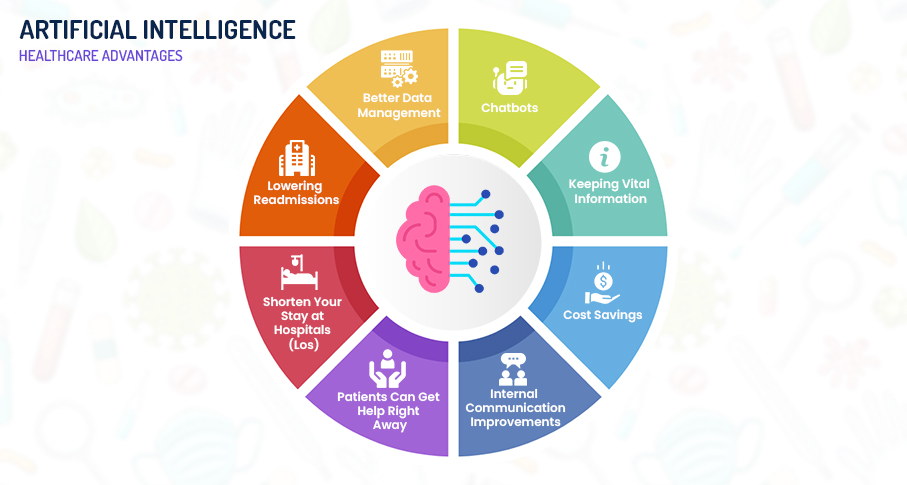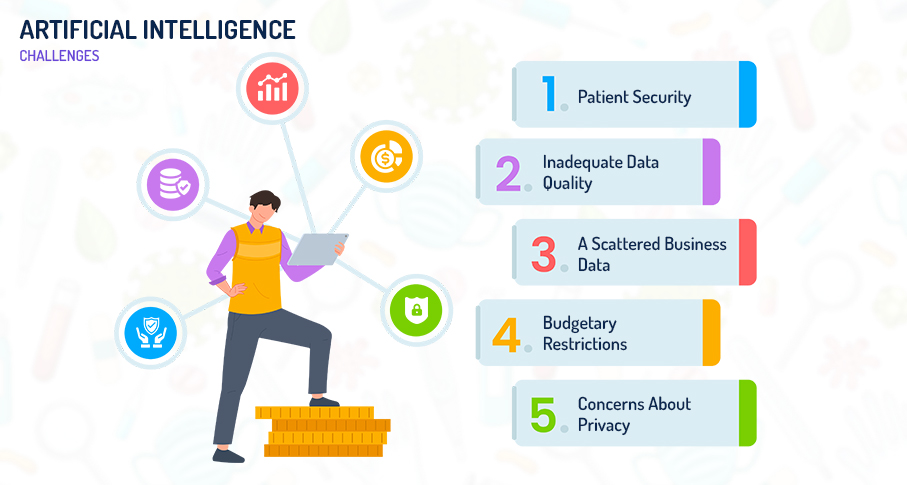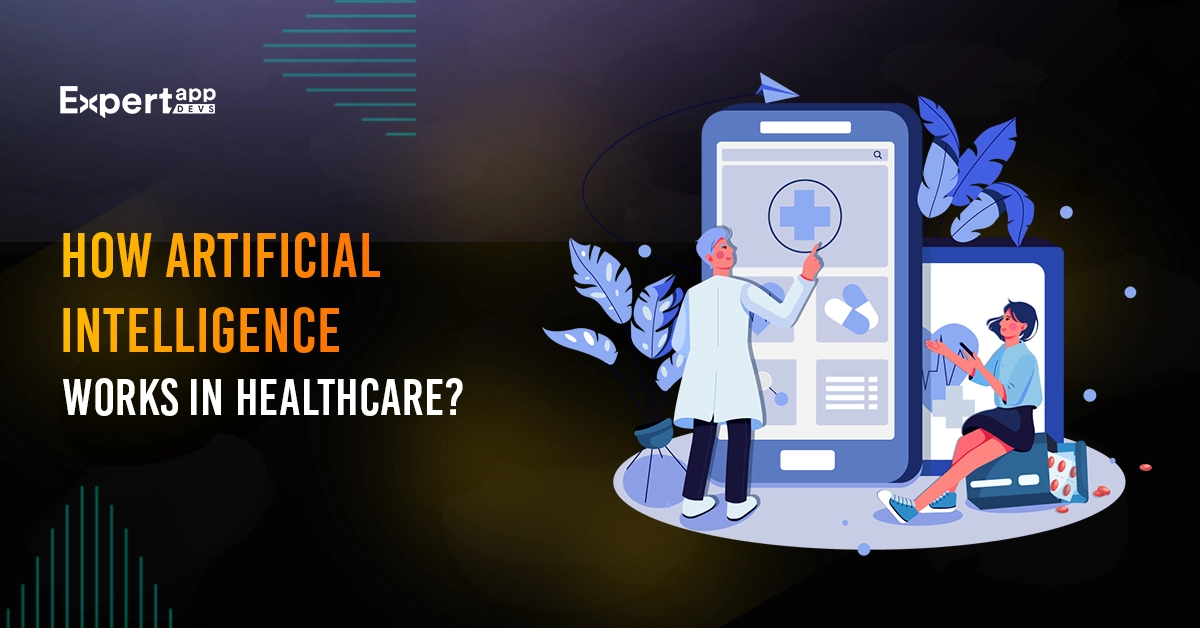How Artificial Intelligence Works in Healthcare?
AI development services have demonstrated that it is far more sophisticated than the human brain at analyzing and segmenting patterns in massive amounts of data. It is generated by electronic healthcare records, social media, patient summaries, pharmaceutical data, behavioural and socioeconomic indicators, and much more. AI explores data and reveals behavioural patterns and regularities that doctors cannot detect.
By entrusting ai/ml development services with the task of identifying and analyzing beneficial medical patterns. Healthcare providers can develop overall medical approaches, and become more efficient and fruitful in the long run. It’s a win-win situation for everyone. AI and ML in healthcare is a relatively new phenomenon, but it is rapidly reshaping the industry.
How is AI Helping in the Healthcare Industry?
The AI technologies used in healthcare today are just getting started. More ambitious technologies are on the way that will involve the combination of multiple data sources, providing even greater benefits.
Let's take a look at the various types of AI technologies that are currently in use.
1. Recognition of Optical Characters
For software and hardware engineers, teaching machines to recognise and comprehend visuals in the same way that the human brain does was a huge challenge. We have succeeded in endowing our computers with vision, resulting in even more digitised benefits.
In the field of healthcare, computer vision can be used to recognise various types of visual data, including handwritten documents and recognised by a specialised neural network. AI will ultimately improve the efficiency of modern healthcare through this and other applications.
2. Expert Systems Based on Rules
Since the 1980s, expert systems based on variations of the 'if-then' rule have been the dominant technology for healthcare AI. Unlike ML, programmers manually encode a vast library of behavioural management to allow the system to operate.
When the number of behavioural patterns exceeds a few thousand, certain patterns begin to conflict with one another, causing the system to crash. Healthcare providers are increasingly turning to AI development services in healthcare instead of rule-based systems, particularly when data sets become very large.
Here Are Some Examples of Who Can Benefit from AI's Current Application in Healthcare:
- Clinicians and researchers use AI to speed up clinical trials. AI aids in the acceleration of medical coding search and confirmation, which is critical during the conduct and completion phases of clinical studies.
- Patients can connect with a virtual agent to obtain personalised health plans from their doctor.
- AI can help doctors diagnose diseases more quickly and provide better care to patients.
Benefits of AI in Healthcare
Digital transformation in healthcare enables the development of systems for both patients and medical personnel and relieves physicians of some of their workload.
Let’s go over some of the advantages in greater detail.

1. Better Data Management
Hospitals must deal with massive amounts of patient data as well as stringent health privacy laws. It takes a lot of time and effort to collect and store patient data. The digitization process creates a centralized space where all data is stored and analyzed.
2. Lowering Readmissions
Reducing hospital readmissions is a significant challenge for healthcare providers. Medicare payments are linked to readmission rates, and ignoring this issue can be costly. Machine learning tools have the potential to transform care delivery. These tools provide clinicians with daily guidance on which patients are most likely to be readmitted and how they can reduce that risk.
3. Shorten Your Stay at Hospitals (Los)
The average number of days a patient spends in a hospital after being admitted determines the quality of care, costs, and readmissions. Health systems can reduce LOS and improve other outcomes such as patient satisfaction by identifying patients who are at risk of having an increased LOS and ensuring that best practices are followed.
4. Patients Can Get Help Right Away
AI/ML development services enable patients to request assistance from their mobile devices at any time. This increases trust between medical staff and patients while also reducing the workload for busy physicians.
5. Internal Communication Improvements
Medical doctors work together with other doctors to provide the best diagnosis and treatment plan. Hospitals require a smooth and functional internal communication channel to streamline this process and ensure correct and timely diagnoses.
6. Cost Savings
Despite initial investments, digital healthcare innovations reduce costs for both hospitals and patients in the long run. Hospitals can cut costs by using data to predict staffing capacity, offering assistance through apps and websites, and minimizing human errors. Telemedicine applications provide patients with more affordable medical care. Residents of rural and remote areas can save money on transportation by using apps and connecting with healthcare professionals from the comfort of their own homes.
7. Keeping Vital Information
A large amount of data are lost in the processes when the data is stored and is not available when needed. If hospitals do not make the effort to collect and analyze data, they will miss out on crucial data that will aid in future research. AI development companies can save massive amounts of data, including unstructured raw data that can be used later. Because research, drug development, and treatment development all rely heavily on data, keeping it alive is a critical step in improving medical care quality.
8. Chatbots
People will look up their symptoms before going to the doctor. 89 per cent of patients Google their health symptoms before making an appointment. Some tech start-ups are aware of the issue and are attempting to solve it through AI-powered Chatbot development services. Consider how much autonomy you’d have as a patient if you could reach into your pocket, open an app, and diagnose yourself by chatting with an AI-powered health companion. That is where the chatbots are headed in the future, and some companies are already getting there.
The Challenges of Adopting AI in Healthcare
The widespread adoption of innovative technologies such as AI and ML presents several challenges. Some roadblocks exist for the healthcare industry using ML-based software and technologies, ranging from a lack of quality data to patient safety.
So, here are some examples:

1. Patient Security
Algorithms make decisions based entirely on the data from which they have learned. If the input is not correct, the result will be incorrect as well. The erroneous decisions can harm or even kill the patient.
2. Inadequate Data Quality
The quality of the data fed into machine learning algorithms determines the results. Medical data is not always as precise and consistent as it should be. There are gaps in the records, inaccuracies in the profiles, and other issues. So, before you can use a machine learning tool, you must first gather, clean, validate, and structure data for the purpose.
3. A Scattered Business Data
The issues that digitalization can address may be invisible to stakeholders and decision-makers. But to increase transparency, healthcare executives must conduct surveys and interviews, collect data, and compile a list of issues that the organization is dealing with. This list will assist executives in defining and implementing potential solutions.
4. Budgetary Restrictions
Healthcare is a government-funded industry, which complicates the process of finding additional investments. Executives must provide concrete data demonstrating how much money is lost as a result of inefficient processes. Furthermore, to receive adequate funding, they must demonstrate which technology of can solve these problems and how much money can be saved.
5. Concerns About Privacy
Another significant challenge of implementing in healthcare is the volume of data collected, which contains sensitive or confidential information. This necessitates the implementation of additional security measures. As a result, it's critical to find the right AI development company that can provide a variety of security options to ensure your customer data is handled properly.
Why Adopt AI/ML Development Services Now?
With all of the benefits, why are we discussing healthcare transformation now? This is due to the increased capacity of healthcare systems during the pandemic. Emerging challenges, such as a lack of masks, sanitizers, ICU space and equipment, a lack of safety protocols, and so on. This has forced medical staff to quickly adapt to the changing environment and adopt new regulations.
Within a few weeks, healthcare executives created new guidelines and frameworks to respond to various situations, implemented technologies such as chatbots and telemedicine, and effectively collaborated with other nearby healthcare providers.
This pandemic-induced process acceleration can aid in the advancement of innovation across industries, and other healthcare facilities. While the pandemic killed millions, it also gave us the ability to reshape the medical industry and avoid such tragedies in the future.
Let’s understand how an AI development company, can help you up your technological game.
READ MORE: How To Develop AI-Based Application – A Step By Step Guide
The Future of Artificial Intelligence in Healthcare
It took thousands of years of human civilization to understand basic medical concepts, and now AI is here to change our understanding of medicine and health care. Medical schools and universities around the world are unable to keep up with the rate of change. This demonstrates AI's incredible speed and efficiency in changing our understanding and practice of healthcare. What does the future of AI hold?
Let's take a look at some other technologies that will most likely use AI to empower and evolve the healthcare industry in the future.
Augmented and Virtual Reality
Virtual reality (VR) and augmented reality (AR) are changing the way many industries look. Construction, e-commerce, gaming, education, and other fields are utilising these technologies.
Consider how wonderful it will be for doctors to gain clinical experience by using realistic simulations and putting theories into practice in class. Using AR and VR technologies to train healthcare workers will increase their competence while decreasing teaching time. It has been reported that using VR to teach healthcare workers improves skill retention by 75% and reduces skill fade by up to 52%.
VR and AR can also help surgeons reassure patients before major surgical procedures. Many patients are afraid of uncertainty; doctors could dispel these fears by explaining the entire procedure to the patient using simple digital instruments.
Customized Mobile App Development Services
The concept of not using smartphones is incomprehensible to modern humans. Today, almost every citizen in the world owns a smartphone. According to statistics, the majority of people use their phones for at least four hours per day. As a result, various apps began capitalizing on this by connecting people all over the world.
We see enormous potential in providing direct doctor-patient communication using the most recent advances in human technology. These trends could be seen in the early stages of the pandemic. Before Covid-19 destroyed the old reality, many people were terminally ill. For these people, direct communication with doctors was (and still is) a matter of life and death.
As this problem became more prevalent, software developers responded with digital solutions. In the future, mobile applications will be customised for patients and combined with AI to improve features such as pill and dose reminders, blood pressure monitoring, heartbeat or other reminders, remote doctor appointments, and more.
Wrapping Up
Solutions powered by AI can help people make better-informed decisions, and reliably detect and diagnose. These are just two of the many applications of AI. AI and machine learning will change people's perceptions of wellness and healthcare in a variety of ways. The ability of AI to self-learn and detect patterns in data that humans find difficult, if not impossible, to detect is extremely valuable.
As a leading mobile app development company, we have created many scalable digital healthcare solutions based on our client's needs. We have a highly skilled development team that has mastered all of the ai/ml development services such as AI, ML, and IoT, required to drive the right healthcare digital strategy for your business.
We have also partnered with several healthcare organizations on various digital healthcare solutions that have helped them increase revenue, reduce costs, and provide a better customer experience.
 Jignen Pandya
Jignen Pandya




